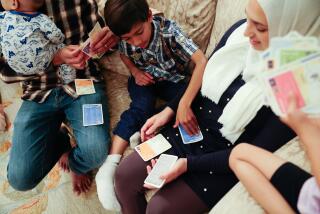PEOPLE : Getting Religion : Parents are increasingly trying to introduce their children to activities at churches and synagogues at a young age.
- Share via
Since Andrea Fils was 2, she has regularly gone to the Friday evening Tot Shabbat at Temple B’nai Hayim in Sherman Oaks.
About 150 children and their parents meet for a 20-minute class that includes songs, blessings and basic explanations of the symbols and celebrations of Judaism.
The Rev. Philip Napwick, pastor at St. Stephen’s Lutheran Church in Granada Hills, says some new parents order crib mobiles that dangle pictures of characters from the Bible over their infants, part of the church’s special curriculum for early religious education.
At St. Martin-in-the-Fields Episcopal Church and Day School, 2-year-olds listen to informally presented Bible stories instead of being in child care while their parents attend church.
Religious leaders have noticed a trend toward baby boomers returning to the fold, and these parents are introducing their children to organized religious education not long after the youngsters learn to walk. And more and more families are finding that the education the church or synagogue can offer their children is a necessary supplement to whatever the parents are comfortable offering at home.
“Young families are saying they want their kids to have the religion they didn’t have as they were growing up,” says Sally Olins, rabbi at Temple B’nai Hayim. But many of these parents, she says, are unsure how to explain the Bible stories and symbolism to their children, and may have gaps in their own understanding.
So Olins tries to demystify the religion, and she lets parents know they don’t need to have all the answers. “I tell them: Whatever you don’t know, I’m here to teach you,” she says.
At one recent Tot Shabbat, Olins stood before the children explaining that the blowing of the shofar--a tradition of Rosh Hashana--was really a wake-up call, a new beginning. She had an assistant blowing the horn louder and louder, while the children yelled out in unison that the horn still wasn’t loud enough.
“It’s playful and fun, and that’s important,” Olins says. The 3-year-old program combines games, stories and puppet shows with baking and crafts to make the Friday night children’s services meaningful, she says.
Introducing children to religious education early pays off, Olins says. “There’s more inclination to pursue a religious life if you start early,” she says. “You need to give children a sense that there’s something greater, an awe, an appreciation of our life.” Olins encourages parents to reinforce what the children learn in Tot Shabbat, lighting candles at home on Friday nights and saying a blessing over bread and wine before dinner.
The Rev. James A. Maronde, rector and headmaster at St. Martin-in-the-Fields Episcopal Church, says that starting children early with religious education is important because early childhood is a time when kids are most receptive to the teaching and to the experience of religion.
“Listening to Bible stories--it’s like the sun shining on them--they respond to the stories very well,” he says. “It’s not a cognitive understanding but it’s really the way the children learn to live their lives,” Maronde says.
Part of the value of such training, Maronde says, is that the religious stories are filled with much of the challenge and tragedy of today’s world. “Our task is to give children a realistic viewpoint of life, that it’s not all roses, and the Bible teaches us that that’s the way the world is--but it can be overcome,” he says. “It’s a way of telling children they are not alone.”
Napwick, pastor at St. Stephen’s Lutheran Church, says that while formal religious education is important, the real key to helping children build religion into their lives still lies with the parents. Religion isn’t something parents can send out for, he says.
Now the children might be the ones pressuring their parents for more religious ritual and celebration. Deborah Fils, 34, of Sherman Oaks says her 5-year-old daughter, Andrea, is lobbying her and and her husband to participate more in religious traditions at home and at the temple.
“The holidays have a lot of meaning for her now--since she has been attending Tot Shabbat--and she has put more expectation on us to recognize the traditions at home,” says Fils. “We’ve begun observing more, because Andrea expects it. How can you tell your child ‘no’ to something like that?”
More to Read
Sign up for Essential California
The most important California stories and recommendations in your inbox every morning.
You may occasionally receive promotional content from the Los Angeles Times.










